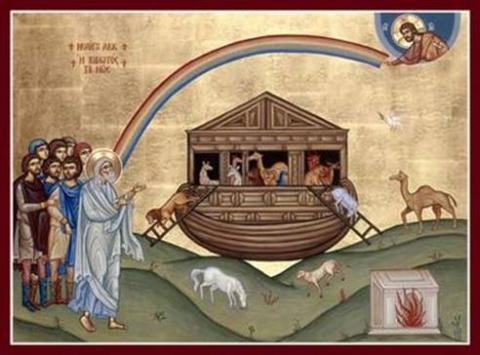Noah
NOAH
Possible Lesson Plan:
- Open with prayer.
- Scripture reference: Genesis 6-8. Long reading of a story very familiar to most of the students. See if they can write the salient features in 10 sentences or fewer as if they were writing a story or skit for smaller children.
- Service references: The Church uses Noah as a prefigurement of Theophany. In the blessing of the waters, “Thou art our God, who has drowned sin through water in the days of Noah,” and again in matins, “We know that in the beginning Thou hast brought upon the world the all-ruining flood, Unto the lamentable destruction of all things, O God who revealest wonders most great and strange: And now, O Christ, Thou has drowned sin in the waters unto the comfort and salvation of mortal men.”
In the Canon of St. Andrew of Crete, sung during the first week of Great Lent, we can lament with St. Andrew: “I have imitated those who in the days of Noah indulged themselves, and like them I deserve to perish in a flood. Noah's son Ham failed to conceal his father's nakedness, and even dared to look at him in his shame. And you, my soul, in your treatment of your neighbour have imitated him.”
- Discussion:
What puzzles you about the Flood? About Creation? How can we reconcile the Biblical account of Creation and the Flood with the theory of evolution taught as fact in many of our schools? Darwin’s initial theory involves the limited and observable movement within a species to better adapt to its environment. But many people have enlarged that theory to include all of creation and history. Discuss the theory of evolution and the Biblical story of Creation and the Flood. Is one more plausible than the other? Is there evidence to “prove” evolution or is it a theory? List several pieces of “evidence” given to prove evolution: (fossils, carbon 14 dating, basic cell structural similarities; let the students brainstorm) Now see if they can explain these same things using Creation and the Flood. (Whole beds of animals and plants were buried in mud in the Flood…Carbon 14 dating assumes a continuity of solar radiation, not the vast difference before and after the waters in the heavens fell to earth…If God made a good thing, why change it for every species?) So… Why has the scientific world (with few exceptions) accepted evolution as fact and “creationists” as religious crackpots? Do people tend to interpret information through the filter of their own beliefs? Everyone agrees that Christians have a “bias” towards Creation; but do non-believers also have a bias that blinds them to instances that do not “fit” the theory of evolution? What would have to happen for algae to become a person? Let students brainstorm a moment. Does it seem likely? Is there any evidence, let alone proof, that this could happen?
Is the point of the story of Noah to argue the case of Creationism? It’s easy to get caught up in winning an argument or proving a case. But, what is the true “point” of Noah? Brainstorm a bit. Obedience to God even though the requested service is “silly”? Think about how Noah must have felt, building that ark in his yard with all the neighbors laughing their heads off. Have you ever had to do something “silly” to serve the Lord? Something other teens will laugh at? How did Noah respond? How do we respond? Is this “peer pressure”?
- Close with prayer: Have each teen consider some situation where he or she was afraid to look silly and bowed to peer pressure and pray for courage to obey God the next time.

T